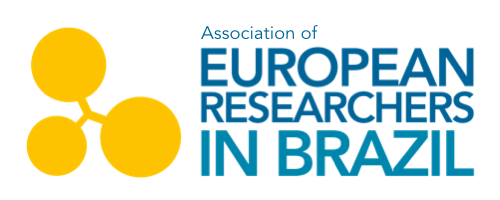-
 France: Start Programme - Fellowships Funding Scheme 2025 - ‘PhD Thesis grants'The call for applications is open to PhD thesis projects on emerging infectious diseases (EIDs). The emerging or re-emerging nature of the disease(s)/pathogen(s) studied must be justified in the applications.
France: Start Programme - Fellowships Funding Scheme 2025 - ‘PhD Thesis grants'The call for applications is open to PhD thesis projects on emerging infectious diseases (EIDs). The emerging or re-emerging nature of the disease(s)/pathogen(s) studied must be justified in the applications. France: STIC-AmSud / MATH-AmSud / CLIMAT-AmSud 2025 Regional ProgrammesCalls for Regional Programmes STIC-AmSud / MATH-AmSud / CLIMAT-AmSud 2025 are OPEN!
France: STIC-AmSud / MATH-AmSud / CLIMAT-AmSud 2025 Regional ProgrammesCalls for Regional Programmes STIC-AmSud / MATH-AmSud / CLIMAT-AmSud 2025 are OPEN! Triangular Cooperation Programme for Latin America and the CaribbeanThe purpose of this programme is to boost triangular cooperation in the Latin American region as a modality for achieving the SDGs, and to direct it towards a more advanced model. This model will have a more innovative workflow based on transformative processes and elements, keeping in step with the region's current needs and challenges.
Triangular Cooperation Programme for Latin America and the CaribbeanThe purpose of this programme is to boost triangular cooperation in the Latin American region as a modality for achieving the SDGs, and to direct it towards a more advanced model. This model will have a more innovative workflow based on transformative processes and elements, keeping in step with the region's current needs and challenges. 2 April 2025 - 2 April 2025Virtual information session on the MSCA Staff exchanges call, Unicamp, 2 April 2025Registration mandatory
2 April 2025 - 2 April 2025Virtual information session on the MSCA Staff exchanges call, Unicamp, 2 April 2025Registration mandatory 30 April 2025 - 30 April 2025MSCA postdoctoral fellowships proposal writing - Presential training in BrasiliaBrasilia, DF (30/04). 23 seats only! Registration open until 13/04
30 April 2025 - 30 April 2025MSCA postdoctoral fellowships proposal writing - Presential training in BrasiliaBrasilia, DF (30/04). 23 seats only! Registration open until 13/04Are you a European researcher based in any Latin American and the Caribbean country?
Please, take our survey at https://bit.ly/EUScienceDiasporasLAC: EURAXESS wants to work with you!
-
You will find below fellowships, grants and other funding opportunities for your research stays in Europe including hundreds of support schemes for research cooperation and mobility between EURAXESS WW and Europe. EURAXESS covers all research fields, including Social Sciences and Humanities, Life Sciences and Physical Sciences and Engineering.
If you wish to browse the global jobs and funding database, please click below:
BROWSE THE PARTNERING TOOL Browse the global jobs and funding BROWSE FOR HOST INSTITUTIONS
 28 Feb 2025 - 28 Feb 2025Join us for an exclusive webinar: 28 February 2025 - 10.00-12.30 | Navigating the European Competence Framework for Researchers | Webinar - ERA TALENTWebinar: Navigating the European Competence Framework for ResearchersAbout the Webinar:Join us 28. February 2025 at 10:00 CET for the first webinar in a series focused on the recruitment of researchers and their careers in both academic and non-academic public sectors. Organized under the ERA Talent
28 Feb 2025 - 28 Feb 2025Join us for an exclusive webinar: 28 February 2025 - 10.00-12.30 | Navigating the European Competence Framework for Researchers | Webinar - ERA TALENTWebinar: Navigating the European Competence Framework for ResearchersAbout the Webinar:Join us 28. February 2025 at 10:00 CET for the first webinar in a series focused on the recruitment of researchers and their careers in both academic and non-academic public sectors. Organized under the ERA Talent EU and India Deepen Strategic Engagement at the Second Trade and Technology Council MeetingStrengthening the EU-India PartnershipThe European Union and India have taken another step forward in their strategic partnership through the second ministerial meeting of the EU-India Trade and Technology Council (TTC) held in New Delhi. The discussions focused on fostering deeper collaboration in
EU and India Deepen Strategic Engagement at the Second Trade and Technology Council MeetingStrengthening the EU-India PartnershipThe European Union and India have taken another step forward in their strategic partnership through the second ministerial meeting of the EU-India Trade and Technology Council (TTC) held in New Delhi. The discussions focused on fostering deeper collaboration in 6 Mar 2025 - 6 Mar 2025EU-Korea Research & Innovation Day 2025The Republic of Korea and the European Union are embarking on a new chapter in research and innovation collaboration. With Korea's Association to Horizon Europe as the first Asian country starting in 2025, we are entering an era of strengthened partnerships and unprecedented research opportunities
6 Mar 2025 - 6 Mar 2025EU-Korea Research & Innovation Day 2025The Republic of Korea and the European Union are embarking on a new chapter in research and innovation collaboration. With Korea's Association to Horizon Europe as the first Asian country starting in 2025, we are entering an era of strengthened partnerships and unprecedented research opportunitiesThere are numerous opportunities for travel and research collaboration between Europe and Brazil / Latin America and the Caribbean. Read more below.
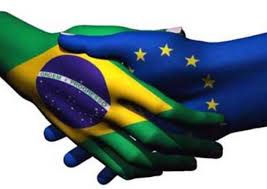
Legal Framework
EU-Brazil cooperation relations are based on the 1992 Framework Co-operation Agreement signed in June 1992 and ratified by the Brazilian Congress in May 1995. In 2007, the EU recognised Brazil as one of its key global partners through the establishment of the formal EU-Brazil Strategic Partnership.
Academic cooperation
Between 2007 and 2013, the EU and Brazil promoted academic cooperation between European and Brazilian higher education institutions. For 2014 to 2020, the EU has made €163 million available for regional cooperation with Latin America in higher education inside Erasmus+.
EU-Brazil Science and Technology Agreement
Brazil and Europe have a long research cooperation tradition in the area of Science & Technology culminating in the signing in 2004 of the Agreement for scientific and technological cooperation. The agreement entered in force in 2007 and last renewed until August 2022 and aims at encouraging, developing and facilitating cooperative activities in areas of common interest, based on the principles of mutual benefit, timely exchange of information, reciprocal access to activities and protection of intellectual property rights.
The implementation of the cooperation agreement is managed by a joint steering committee which meets on a regular basis and has as main tasks to indicate priority sectors of mutual interests and advise on ways to improve cooperation.
The final declaration of the 6th EU-Brazil Summit, held in 2014, highlighted the fact that competitiveness, innovation and economic growth cannot be achieved without strengthening cooperation in science and technology.
The main areas of scientific cooperation are:
- Marine Research
- Health
- Bio-economy
- Transport, including aviation
- Energy (in particular advanced biofuels)
- Nanotechnology
- Sustainable urbanisation and environmental research
- Information and Communication Technologies
- Fusion Energy
- Cooperation with the Joint Research Centre.
Other cooperation agreements
ADMINISTRATIVE ARRANGEMENT
On 22 May 2018, the European Commission and the Brazilian National Council for Scientific and Technological Development (CNPq), the Brazilian Funding Agency for Studies and Projects (FINEP), and the Brazilian National Council of State Funding Agencies (CONFAP) signed an agreement aiming at enhancing their coooperation in research and innovation called “administrative arrangement - AA". The AA aims at enhancing Brazilian participation in Horizon 2020, the EU’s research and innovation programme.
Under this umbrella, CNPq published its Guidelines for the preparation of research proposals for the CNPq in collaboration with proposals submitted to EU Horizon 2020 that set the rules for Brazilian parts willing to have research and innovation co-financing grants from H2020 programmes.The Administrative Arrangement was renewed on 19 November 2021, paving the way for a smoother Brazilian participation in Horizon Europe proposals. More: https://bit.ly/EU-BR_AA
EURATOM
The Agreement for Cooperation between the European Atomic Energy Community (EURATOM) and Brazil set in 2009 in the field of fusion energy research was ratified in December 2012 and came into force in January 2013.
Joint Research Centre - JRC
In the context of the 6th EU-Brazil Summit held in Brasília in January 2013, a Cooperation Arrangement was signed between the Joint Research Centre (JRC) of the European Commission and the Ministry of Science, Technology and Innovation (MCTI) to undertake training and cooperation activities in the areas of disaster prevention and crisis management; climate change and sustainable management of natural resources and ecosystem services; energy, including bioenergy and smart grids; food security; bioeconomy; information and communication technologies (ICT), as well as nanotechnologies.
Implementing Arrangement between the European Commission and the Brazilian National Council of the State Funding Agencies (CONFAP)
The implementing arrangement was signed and entered into force on 13 October 2016. It aims at encouraging the best Brazilian scientists to join research teams funded by the European Research Council (ERC).
Under this arrangement, Brazilian post-doctoral grantees from the State Funding Agencies (FAPs), from the Coordination for the Improvement of Higher Education Personnel (CAPES) and from the National Council for Scientific and Technological Development (CNPq) can undertake short or long term research visits, in Europe, and collaborate with ERC-funded teams, conducting frontier research across Europe.
The EU promotes international cooperation in science and technology through its Horizon Europe framework programme. This programme runs from 2021 to 2027 and has a budget of over €95,5 billion.
Brazilian participants (individual researchers and/or institutions) can join projects in any area. Horizon Europe therefore provides the EU and Brazil with the opportunity to build on what is already a fruitful area of collaboration.
The Excellent Science Pillar of Horizon Europe offers dedicated programmes like Marie Sklodowska-Curie Actions and The European Research Council (ERC) to support the best research talents irrespective of their nationality with fellowships and grants.
For the more information on 2023-2024 and other forthcoming calls, please visit the European Commission Funding and tender portal. Please click on Online Manual for additional insight.
Under the previous programme, Horizon 2020, Brazil ranked sixth amongst the most active non-associated third countries and first in the Latin America and Caribbean region.
Selection of Calls of potential interest for Brazil and LAC for 2023-2024
In order to encourage the participation of Brazilian researchers under Horizon Europe calls, an indicative list of calls with international cooperation as priority was compiled. These particular calls are specifically open or focusing on collaboration with the Latin American region or specific countries of the region, like Brazil and Mexico. Calls cover the timeframe of 2023 to 2024 and are divided by clusters and main programmes. Find the list here.
Funding of Brazilian participation
Brazil was in the top five non-European countries in terms of active participation in the EU’s 7th framework programme for science and technology (FP7) and in the top six under Horizon 2020.
In Horizon Europe, Brazilian entities are not automatically eligible for funding and must, therefore, determine the sources of funding and resources for their part of the project. Please, note that Individual Brazilian researchers are eligible for EU funding under the European Research Council programme and Marie Sklodowska-Curie Postdoctoral Felowships. They can also carry out a PhD funded by MSCA.
Existing co-funding mechanisms in Brazil (under Horizon 2020, new conditions under Horizon Europe will be published ASAP)
1. Different funding schemes are being set up in different Brazilian states through the existing Research Foundations (FAPs) in each state to fund Brazilian participation in Horizon Europe collaborative projects.
Under the previous programme Horizon 2020, co-funding schemes for Brazilian researchers were available in the following states:
- Fundação de Amparo à Pesquisa do Estado de São Paulo - FAPESP
- Fundação de Amparo à Pesquisa e Inovação do Estado de Santa Catarina- FAPESC
- Fundação de Amparo à Pesquisa do Estado de Goiás - FAPEG
- Fundação de Amparo à Pesquisa do Estado de Minas Gerais - FAPEMIG
- Fundação de amparo à Pesquisa do Distrito Federal - FAPDF
- Fundação Araucária de Apoio ao Desenvolvimento Científico e Tecnológico do Estado do Paraná – FAPPR
- Fundação de Amparo à Pesquisa e Inovação do Espírito Santo - FAPES
- Fundação de Apoio ao desenvolvimento do Ensino, Ciência e Tecnologia do Estado de Mato Grosso do Sul - FUNDECT
- Fundação de Amparo à Pesquisa e ao Desenvolvimento Científico e Tecnológico do Maranhão – FAPEMA
- Conselho Nacional das Fundações Estaduais de Amparo à Pesquisa - CONFAP
Read INCOBRA Factsheet on the FAPs guidelines here for more details.
2. In addition and thanks to the administrative arrangement to enhance EU-Brazil coooperation in research and innovation signed in 2017, by the European Commission, CNPq, FINEP and CONFAP, CNPq published its Guidelines for the preparation of research proposals for the CNPq in collaboration with proposals submitted to EU Horizon 2020 that set the rules for Brazilian parts willing to have research and innovation co-financing grants from H2020 programmes.
Cooperation in ICTs
The EU and Brazil are jointly engaged in addressing issues relating to information and communication technologies (ICTs).
An EU-Brazil Information Society Dialogue, held in 2012, agreed a €10 million call for proposals to fund ICT projects of common interest. The two parties also shared their experience and knowledge of policy and regulatory issues in areas such as broadband development, governance and internet security, cloud computing and digital content.
The importance of cooperation with Brazil in this field comes from the following factors:
the growing influence of the Information Society and ICT in everyday life;
the increasing globalisation of the ICT sector and the leading role played by Brazil in Latin America’s digital economy;
Brazil’s rising importance regarding issues of strategic importance for the EU such as internet governance and information networks and security.
under construction
Institutions based in Latin America and the Caribbean are encouraged to participate in Horizon Europe. All institutions from LAC can join most of Horizon Europe calls as part of a consortium.
Latin American and Caribbean institutions are fully eligible to funding from the European Commission, except institutions from Antigua y Barbuda, Bahamas, Barbados, Brazil, Chile, Mexico, Saint Kitts & Nevis, Trinidad y Tobago and Uruguay.
In the case of institutions (public or private) from countries not automatically eligible to funding, funding can exceptionally be provided if:
- The country is explicitly identified in the work programme and/or call for proposals as being eligible for funding.
- if the granting authority considers that their participation as a beneficiary is essential for implementing the project, for example in view of their:
- outstanding competence/expertise,
- access to particular research infrastructures,
- access to particular geographical environments,
- access to particular data.
In all the other cases, the non-automatically funded institutions have to participate at their own cost. In some cases, such as Brazil, complementary funding mechanisms were implemented by local authorities (see below).
Indicative calls of interest to LAC
An indicative list of calls with international cooperation as priority was compiled. These particular calls are specifically open or focusing on collaboration with the Latin American region or specific countries of the region, like Brazil, Chile and Mexico. Calls cover the timeframe of 2021 to 2022 and are divided by clusters and main programmes. Find the list here.
Co-funding mechanisms (under Horizon 2020, to be updated soon)
In Horizon 2020, participants from Mexico are no longer automatically eligible for funding. In February 2014 Mexico was the first partner country to create a complementary funding mechanism
 . CONACYT-Horizon 2020 provides a source of financing "project-by-project participation" to Mexican partners in successful Horizon 2020 projects covering all thematic areas. More in the Roadmap for EU - Mexico S&T cooperation (2018).
. CONACYT-Horizon 2020 provides a source of financing "project-by-project participation" to Mexican partners in successful Horizon 2020 projects covering all thematic areas. More in the Roadmap for EU - Mexico S&T cooperation (2018).See above in the dedicated section for more details on Brazilian co-funding mechanisms.
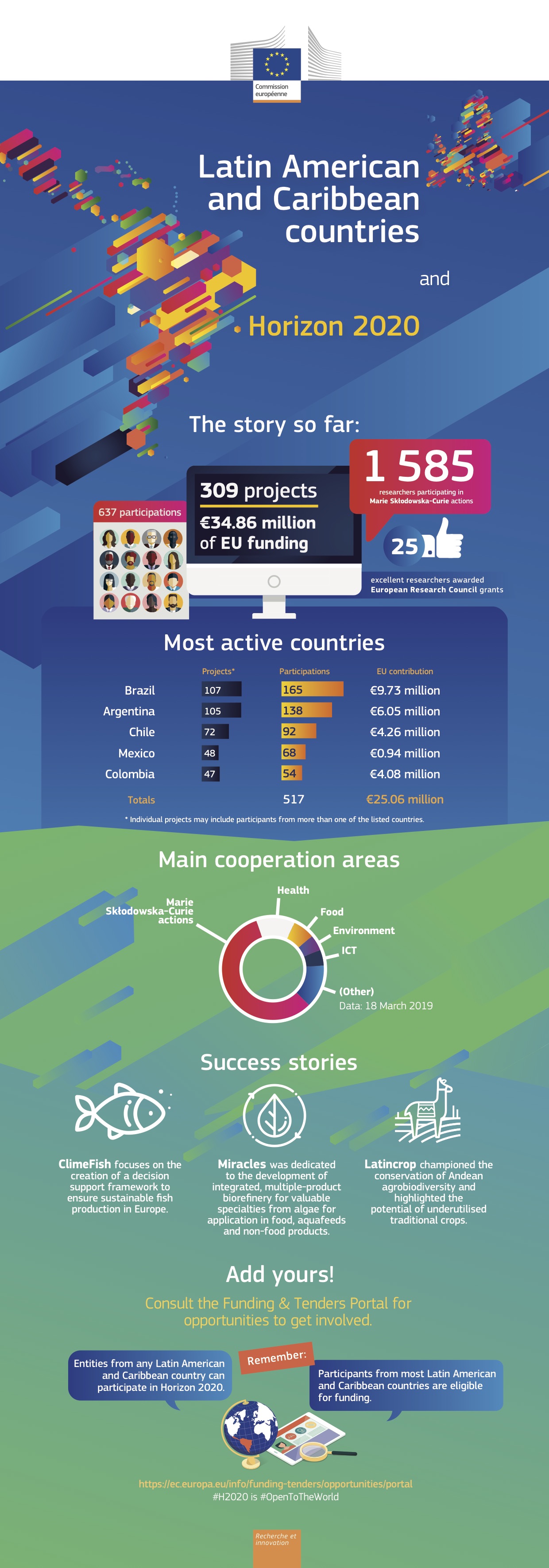
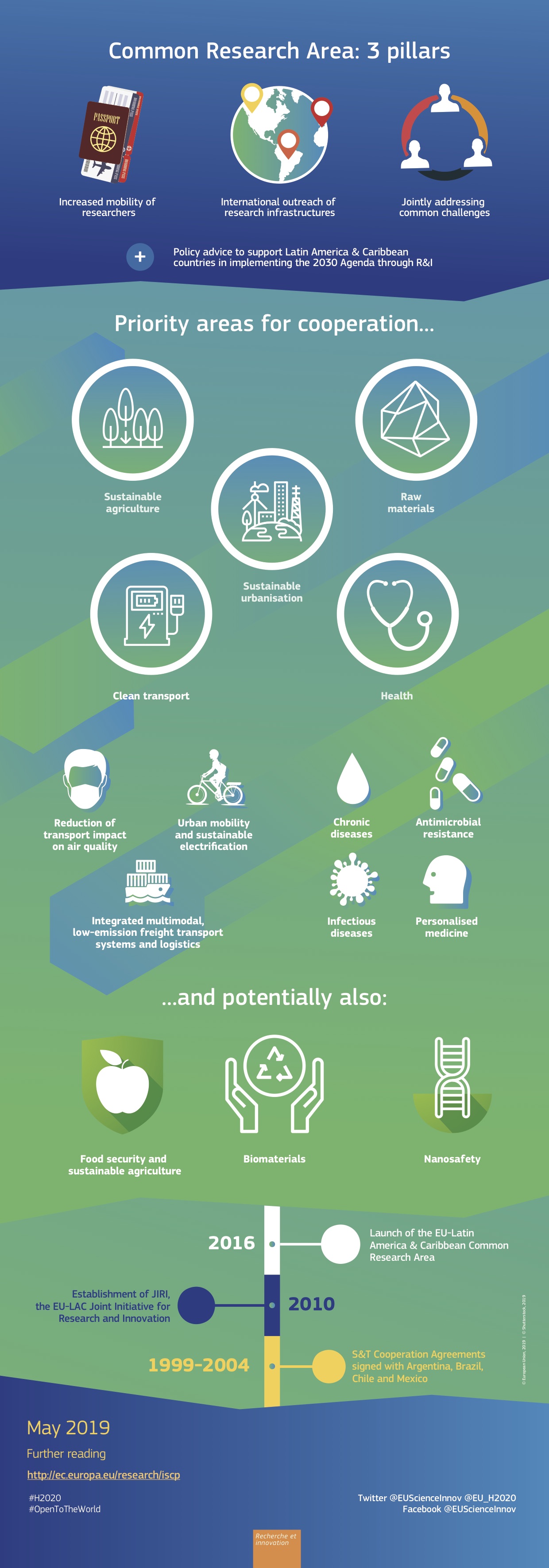
Short- and long-term mobility of researchers both ways is an important driver of the EU-Brazil and EU-LAC research and innovation partnerships.
Individual researchers can take part in mobility programmes under the Marie Sklodowska-Curie Actions scheme (MSCA). Researchers from Latin America and the Caribbean may also apply for the European Research Council (ERC) grants, which are for the most ambitious and highest quality researchers.
Additional opportunities open to researchers from Argentina, Brazil and Mexico: Argentinian, Brazilian and Mexican authorities signed implementing arrangements with the European Commission to allow (postdoctoral) researchers to temporarily join research teams run by ERC-grantees to conduct frontier research activities in Europe.
=> read the short guides we prepared for LAC researchers and institutions, and discover how you can benefit from MSCA here and the ERC here.
Many other institutions and agencies from EU member states and associated countries, third countries, including Argentina, Brazil, Chile, Colombia, Mexico and other LAC countries as well as international foundations also fund researchers mobility.
To support your mobility projects, EURAXESS LAC identifies and regularly highlights schemes to support researcher collaboration, exchange, or mobility. These schemes are available on EURAXESS Funding database and in EURAXESS LAC regular Flashnotes and social media. Register here to receive our automatic notifications.
European Union Member Statesand associated countries have developed many cooperation programmes with Argentina, Brazil, Chile, Colombia, Mexico and other LAC countries in the fields of research and innovation, facilitating collaborative projects between European and LAC research laboratories, increasing researchers' mobility and promoting scientific exchanges between the two regions. To review the range of grants and funding opportunities that are available, please check their Embassies Portals. Their national open calls are also regularly published in the funding portal.
Latest edition:
DownloadEURAXESS Brazil Funding Opportunities September 2020EnglishBRAZIL
(For researchers based in Brazil or wishing to collaborate with Brazil)LAC
(For Hispanic Latin American and Caribbean researchers)DownloadEURAXESS Brazil Funding Opportunities May 2020EnglishDownloadEURAXESS Brazil Funding Opportunities February 2020EnglishDownloadEURAXESS Brazil Funding Opportunities September 2019EnglishDownloadEURAXESS Brazil Funding Opportunities June 2019EnglishDownloadEURAXESS Brazil Funding Opportunities February 2019EnglishDownloadEURAXESS Brazil Funding Opportunities November 2018EnglishDownloadEURAXESS Brazil Funding Opportunities August 2018EnglishDownloadEURAXESS Brazil Funding Opportunities June 2018EnglishDownloadEURAXESS Brazil Funding Opportunities April 2018EnglishDownloadEURAXESS Brazil Funding Opportunities February 2018EnglishDownloadEURAXESS Brazil Funding Opportunities November 2017EnglishDownloadEURAXESS Brazil Funding Opportunities October 2017EnglishDownloadEURAXESS Brazil Funding Opportunities July 2017EnglishDownloadEURAXESS Brazil Funding Opportunities May 2017EnglishDownloadCELAC Funding Opportunities April 2018EnglishDownloadEURAXESS Brazil Funding Opportunities January 2017EnglishDownloadCELAC Funding Opportunities February 2018EnglishDownloadEURAXESS Brazil Funding Opportunities November 2016EnglishDownloadCELAC Funding Opportunities December 2017EnglishDownloadEURAXESS Brazil Funding Opportunities October 2016EnglishDownloadCELAC Funding Opportunities October 2017EnglishDownloadEURAXESS Brazil Funding Opportunities September 2016EnglishDownloadCELAC Funding Opportunities August 2017EnglishDownloadEURAXESS Brazil Funding Opportunities July 2016EnglishDownloadCELAC Funding Opportunities May 2017EnglishDownloadEURAXESS Brazil Funding Opportunities June 2016EnglishDownloadEURAXESS Brazil Funding Opportunities May 2016EnglishDownloadEURAXESS Brazil Funding Opportunities April 2016EnglishDownloadEURAXESS Brazil Funding Opportunities March 2016EnglishDownloadEURAXESS Brazil Funding Opportunities February 2016English -
EURAXESS HELPS YOU SUCCEED
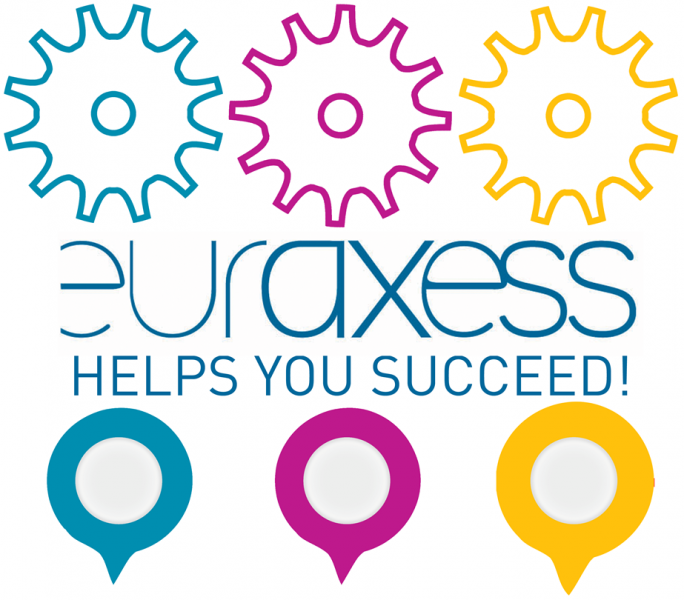
EURAXESS Tutorials
The network of National Contact Points (NCPs) is the main structure to provide guidance, practical information and assistance on all aspects of participation in Horizon Europe.
How to increase your institution’s visibility with the EURAXESS Portal
EURAXESS Partnering tool is useful to find partners, but also to be visible to international partners
How to post a job offer on the EURAXESS portal
Increase your positions' visibility worldwide and recruit research talents from everywhere In the world.
EURAXESS Hosting tool - How to post hosting offers on EURAXESS portal?
Express your institution’s interest in hosting researchers, MSCA or ERC fellows. Open to all institutions, including from Latin America and the Caribbean who are keen on receiving MSCA Global fellows for up to 2 years.
Step by step to MSCA Individual Fellowship proposal - How to submit a MSCA IF proposal
Experienced researchers (completed doctoral degree or at least four years’ full-time research experience) can apply for postdoctoral funding within the MSCA Individual Fellowships. EURAXESS Worldwide team prepared a step-by-step process on how to apply for this type of grant.
Becoming an EC expert in the evaluation of proposals - How to become a Horizon2020 Evaluator?
The European Commission is constantly looking for experts to assist in the evaluation of proposals and project monitoring and to join the peer review groups for Horizon 2020 Framework Programme for Research and Innovation. The call for experts and registration is open throughout the whole period for the Horizon 2020 framework programme (2014-2020).
Brazil and LAC
These guides were specially drafted to highlight how Brazilian and other Latin American and Caribbean students, researchers and institutions can benefit from European mobility schemes:
Country / region specific content:
BRAZIL
- MSCA: Read also our Individual Fellowships applications tips for Brazilians: New opportunities for Brazilian researchers and Brazilian host institutions

(472.25 KB) by Elisa Natola, MSCA National Contact Point for Brazil, Brazilian National Council of State Funding Agencies (CONFAP)
Marie Curie Alumni Association Brazil Chapter

(408.32 KB)
- Focus on Erasmus + for Brazilian students, researchers and higher education institutions

- Read also Brazilian testimonies on Erasmus+ (Jean Monnet activities at UFMG; UFRJ experience with Erasmus Mundus and interview with the Erasmus Mundus Alumni Association - EMA representative in Brazil)
- Interview with Brian Holmes, Director, European Commission Education, Audiovisual and Culture Executive Agency (EACEA)
- Focus on Erasmus Mundus
LAC
Find more about the research landscape in EURAXESS countries:
EU – LAC research collaboration
Implementing arrangements with Argentina, Brazil and Mexico
EU – BRAZIL research collaboration
EU-Brazil implementing arrangement
Report - First meeting of EU researchers in Brazil, 20 April 2021
Additional resources:
In Spanish:
Guía para la participación exitosa de INVESTIGADORES de LAC en las MSCA
Guía para la participación exitosa de INSTITUCIONES de LAC en las MSCA (Red LAC NCP)
Manual de participación en el Horizonte 2020 (Red LAC NCP)
In English:
MEET THE RESEARCHERS
ARTUR AVILAMORE
PABLO EMILIANO TOMATIS
MARIANA DE CAMPOS FRANÇOZO
SOBEK AND MENDONÇA
- MSCA: Read also our Individual Fellowships applications tips for Brazilians: New opportunities for Brazilian researchers and Brazilian host institutions
-
HORIZON EUROPE
ERC

European Research Council: Excellence Opened to the World
The European Research Council (ERC) is a flagship component of Horizon Europe’s Excellent Science. ERC is a top funding body providing funding for excellent researchers of any nationality, to carry out frontier research in Europe, via annual calls. The ERC's mission is to encourage the highest quality research in Europe through competitive funding and to support investigator-driven frontier research across all fields, based on scientific excellence.
MSCA
Marie Sklodowska Curie Actions
The Marie Skłodowska-Curie Actions (MSCA) under Horizon Europe’s Excellent Science pillar provide grants for all stages of researchers' careers and encourage transnational, intersectoral, and interdisciplinary mobility. The MSCA enables research-focused organisations (universities, research centres, and companies) to host talented foreign researchers and to create strategic partnerships with leading institutions worldwide. The MSCA is open to all domains of research and innovation.

ERASMUS
EU IN BRAZIL
Delegation of the European Union to Brazil
Dhallys Mota Nunes
Science, Technology & Innovation Policy Officer
SHIS QI 07, Bloco A, Lago Sul
Brasília, DF. 71615-205, Brazil
Telephone: (+55) 61 2104 31 10
Email: Dhallys Mota Nunes
Visit Website ›› and Facebook page
Read more about EU-Brazil cooperation in Science, Technology and Innovation here.
Useful links
- Delegation of the European Union to Brazil
- European Commission's Directorate General for Research and Innovation (DG Research)
- "What's New" in European Research and Innovation
- European Research Area (ERA)
- Research*eu
The magazine of the European research area
- Horizon 2020
- Research & Innovation international Cooperation
- National Contact Points (NCPs)
- IPR Helpdesk
- European Research Council (ERC)
- Marie Sklodowsha Curie Actions (MSCA)
- European Joint Research Centre (JRC)
- COST - European cooperation in Science and Technology
EU projects in Brazil:
- ENRICH Brazil project (2017-2020)
European network of research and innovation centres and hubs, Brazil - ENRICH, supports and connects European research, innovation and business organisations to Brazil
- INCOBRA project (2016-2019)
Increasing International Science, Technology and Innovation Cooperation between Brazil and the European Union – INCOBRA
- B.BICE + project (2013-2016)
The Brazilian Bureau for Enhancing the International Cooperation with the European Union
- Clim-Amazon
Joint Brazilian-european facility for climate and geodynamic research on the Amazon River Bassin sediments
- Institute for Studies Brazil Europe (IBE)
- Access4.EU's database (Open calls and opportunities for European-Brazilian S&T cooperation within Brazilian funding programmes)
- RTDI database: funding opportunities in non-EU countries worldwide, including in Brazil, which are open to European participants.
- BILAT web portal : single access point to 14 current BILAT projects
- Ministry of Science, Technology, Innovation and Communication
- Brazilian Academy of Sciences (ABC)
- National Council for Scientific and Technological Development (CNPq)
- Coordination for Enhancement of Higher Education Personnel (Capes)
- Brazilian National Council for the State Funding Agencies (CONFAP)
- Brazilian Association for International Education (FAUBAI)
- EURAXESS Jobs Portal
Careers, support and job postings in Europe and Worldwide.
- EMBO excellence in life sciences
- Euro Science Jobs
- Find A Postdoc
- Find PhDs in Europe
- Find Scholarships in Europe
- Jobs at ITER
- Nature.jobs

Cirad (Centre de coopération internationale en recherche agronomique pour le développement)

CNRS (Centre National de la Recherche Scientifique)

IRD (Institut de recherche pour le dévelopement)

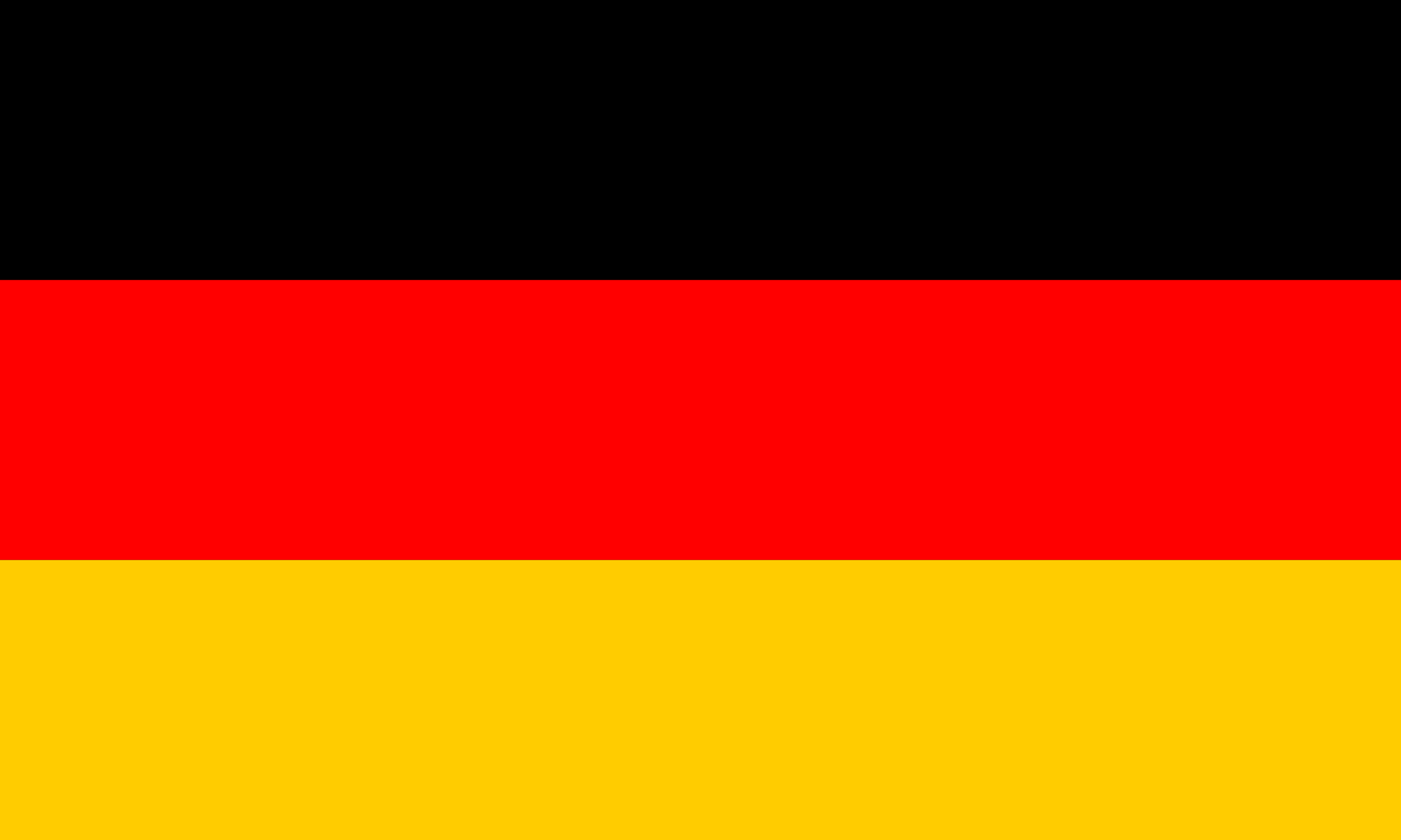
DWIH (German House of Science and Innovation São Paulo)


CISB (Swedish-Brazilian Research and Innovation Centre)

Consejería de Educación de la Embajada de España en Brasil



Nuffic Neso Brazil (Dutch Portal directed at Brazilian students, including available vacancies for Brazilian students in the Netherlands)

EU IN LAC
empty
empty
empty
empty
empty
-
About EURAXESS Brazil/LAC
We promote researcher mobility and cooperation. We serve researchers of all nationalities, all disciplines, and career stages. The membership is free!
We focus on two actions:
To provide regular, tailored, and reliable information
To organise networking and information events
E-Mails: brazil@euraxess.net & lac@euraxess.net
Find us on LinkedIn (LAC) Find us on X (Brazil) Find us on X (LAC)
The EURAXESS LAC team is based in Rio de Janeiro, Brazil, and Bogota, Colombia, from where it covers the whole of Latin America and the Caribbean region.
Visit us in Rio de Janeiro! EURAXESS LAC's office in Brazil is hosted by the French Consulate at Casa Europa, in the city center. It is necessary to schedule an appointment by writing to brazil@euraxess.net.To request a meeting with the Regional Representative in Colombia, please send an e-mail to lac@euraxess.net.
EURAXESS LAC on-site visits in the LAC countries.
It is possible to invite EURAXESS Brazil / LAC team to universities, research institutes, and companies to present the services offered by EURAXESS and more specifically EURAXESS Brazil / LAC, but also cooperation and career opportunities with Europe.
The team covers the main EU's funding framework programme for research and innovation Horizon Europe including opportunities for individual researchers (the Marie Sklodowska-Curie Actions - MSCA and the European Research Council - ERC) as well as for research institutions (Global Challenges, MSCA SE & MSCA DN)Depending on your needs, the interactive session can target faculty members, senior scientists, or young researchers.
If you wish to organise such a presentation in your organisation, please contact brazil@euraxess.net or lac@euraxess.net.
Virtual presentations (webinar or videoconference) are also available for all LAC countries.
If you would like to co-organise an event with EURAXESS Brazil / LAC or to share ideas and suggestions, please do so by writing to brazil@euraxess.net or lac@euraxess.net.
For any questions related to Horizon Europe, contact the Research & Innovation Section of the EU Delegation to Brazil: DELEGATION-BRAZIL-CIENCIA@eeas.europa.eu
For EU funding of researchers' mobility, contact Marie Sklodowska-Curie Actions MSCA and the European Research Council ERC National Contact Points (NCPs) in your country. Their contact can be found at bit.ly/HorizonEurope_NCP.
EURAXESS Brazil / LAC team can also provide you with useful information and present the funding opportunities. Contact us at brazil@euraxess.net or lac@euraxess.net.
To receive updates on EURAXESS LAC activities in Brazil and other Latin American and Caribbean countries, but also information on EU-Brazil / EU-LAC scientific cooperation and opportunities, sign up for our mailing list at http://bit.ly/EuraxessBR_LAC_Mailing

Brazilian National Council for the State Funding Agencies - CONFAP
CONFAP is a non-profit organization. It was created in 2006 to articulate the interests from Brazilian State Funding Agencies, among other goals
Confap is a key actor of the EU-Brazil cooperation in science, technology and innovation. It hosts MSCA national contact point since 2016 and signed the implementing arrangement with ERC.
The 26 members that compose CONFAP meet in National Forums generally 4 times per year. Since 2013, CONFAP is directed by Sergio Luiz Gargioni (also president of the Santa Catarina State Research and Innovation Support Foundation).

ENRICH in LAC project
Funded by the European Union Horizon 2020 Programme, ENRICH in LAC is an initiative that aims
to promote collaborative opportunities for business and innovation players of Europe and Latin
America and the Caribbean regions.
Working as a network-based initiative, ENRICH in LAC provides consulting, networking and
training services that connects and supports companies, universities, research and technology
organisations and other innovation actors from both continents.


